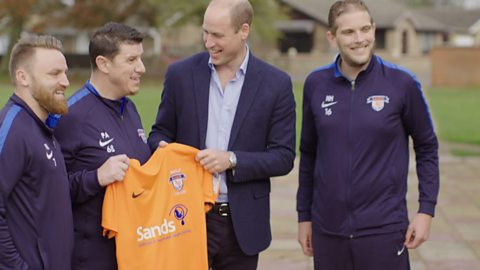Advisory: Contains material of a sensitive nature
VO: When it comes to football - only a handful of professional players have spoken about their mental health. One man who wants to change the culture at the very top of the game is Joe Hart, Englandãs second most capped goalkeeper. Joe won the league twice with Manchester City, but at the height of his career he reached out for professional help
Joe: I didnãt really know how to handle tough moments, you just want to bat everyone away. Like, ãIãm fine, leave me, Iãm fine just leave me.ã
In the 13/14 season, I was finding it difficult because everything had been so easy for me. It wasnãt clicking how I wanted it to.
I missed 5 or 6 games that season, which was the first time Iãd ever been taken out the team. That was when I started working with a mental coach. Managed to communicate well enough with Manuel Pellegrini who was the manager at the time.
If someone questions you, that doesnãt mean that you have to go aggressive or stand off and be like I donãt need to talk to you.
Opened up a line of communication, asked for help, what he thought I could do better, got myself back in the team, won the league again.
VO: Now on the bench at Burnley, Joe is determined to use his experience in a positive way and to drive forward the next chapter of his playing career.
Joe: Itãs certainly the lowest point of my football career but itãs not a dark cloud. Iãm comfortable with whatãs going on. Yeah Iãm sad, yeah Iãm disappointed that Iãm not playing because I know what I want to be. I know where I should be and what I can bring to the game. But at the moment Iãm not being picked, simple as that You know, at school, not being pickedãÎand thatãs hard.
I feel like right now could be a dark time for me, but itãs not, I see it as a challenge.
VO: HRH The Duke of Cambridge has launched a new nationwide campaign to try and tackle the stigma around mental health.
Keen to involve elite players, the Duke has asked to meet Joe.
HRH: I know itãs not been an easy few years for you, with the way the career is going, is that quite difficult to deal with?
Joe: Difficult but Iãve kind of really put myself in a space where, I feel comfortable, I feel relaxed, but thatãs because Iãve took a few whacks.
HRH: Whatãs been the biggest whack youãve taken, whatãs really caused you the biggest upset and worry?
Joe: JustãÎit will sound pathetic but itãs the truth, itãs not playing and not being wanted.
HRH: Joe represents the elite level, a footballer who has seen it all, whoãs been there, whoãs done it and still even someone like Joe faces some of those challenges on a day to day basis and heãs brave and open enough to say yep, professional life hasnãt gone as well as Iãd like it to go these last few years but Iãm not giving up, I want to get it right and if I need a bit of help, I need to talk about it, if I need to be a bit more open, then thatãs a good thing and hopefully others can follow his example.
Joe: Everyoneãs mental health is different. If youãre a teammate, why not invest in a teammate? Why not be able to notice if someoneãs not themselves. And be able to ask them, ãAre you all right?ã, ãIãve got an eye on you, and if you need anything, Iãm here.ã Thatãs a nice feeling to give, and certainly a nice feeling to receive. We train so hard physically but mentally is where every decision comes from. That mental health is the most important thing.
Premier League goalkeeper Joe Hart describes how he overcame a difficult period in his career, which affected his mental wellbeing.
He discusses the importance of looking out for others' mental health as well as your own.
He meets HRH the Duke of Cambridge (as he was known prior to becoming The Prince of Wales) and discusses his experience and how he thinks football clubs can look after players' mental health.
Teacher Notes
This film is suitable for 14-16 year olds, but because it addresses some challenging issues we strongly advise making yourself very familiar with the content before using it and considering carefully whether it will be appropriate and suitable for your specific cohort.
Check class records to see if any of your class have any mental health issues or have personal/lived experience of the topics raised, and consider the best action/support for them in advance.
Check Government guidance on teaching about mental health along with your school policies to make sure you follow these guidelines/protocols and talk to a member of the SLT if you are in doubt about anything before you teach.
Whether you choose to lead a discussion, do an activity or a combination of both, always start your session by setting up a working agreement with the class. Creating a list of rules will make sure everyone feels safe and able to talk and join in without being judged.
Points for discussion
Joe talks about getting himself into a space where he feels comfortable (ãI feel comfortable, I feel relaxedã), even though he also feels sad and disappointed because heãs not being picked to play. How do you get comfortable when life doesnãt feel comfortable? When you feel sad or disappointed? (Answers might include acceptance, keeping calm, talking to friends and family, looking at the bigger picture, dealing with the next thing in front of you, doing the best you can a step, or a day, at a time, being grateful for what you have, not giving up, being realistic, setting achievable goals, working on inner strength, seeing challenges as positives.)
If Joe didnãt ask for help, what could have happened? (If big worries and problems are not talked about they can get bigger and more worrying ã he could therefore have given up, got caught in a spiral of negativity, got depressed or had further mental health issues etc.) 'Talking can be incredibly helpful to make sense of and manage difficult experiences.ã - Heads Together
What can we learn from Joe? When are we ãgood enoughã? What is ãgood enoughã? Would ãgood enoughã look the same for everyone or different? Why?
Suggested activities:
Joe says ãI didnãt really know how to handle tough moments, you just want to bat everyone away. Like, Iãm fine, leave me, Iãm fine just leave me.ã Why did he do this? In groups pupils note their ideas, and feedback verbally or create a graffiti or working wall. (For example, maybe he felt scared, that he wouldnãt be understood or that he might be judged, laughed at, that he didnãt want to bore people or bring them down with his issues or maybe he didnãt know how to start a conversation.) Explain these are all very common reasons why people donãt talk and let them share their thoughts/experiences on this if they feel comfortable doing so. Remind them that Joe changes his negative reactions to his situation - he says he ããÎopened up a line of communication, asked for helpãÎ got myself back in the team, won the league again.ã Is there anything we could change about ourselves from now on or that we could do differently like Joe did? (Explain that having time to reflect on how we react to life can be really helpful - by learning more about ourselves and developing positive coping strategies we can live a more content life, no matter what it throws at us.) You could explore this further through circle time, ãWhenãÎ happens, I react byãÎ, it makes me feelãÎã and/or ãIãm going to tryãÎ when I feelãÎã or through creative writing: ãA new meã.
Joe says, ãWhy not be able to notice if someoneãs not themselves and be able to ask them - are you all right? Iãve got an eye on you and if you need anything, Iãm here.ã Explore these three great ideas for letting friends or team/school mates know you are there for them. Pick this apart with your class ã what might this look like day to day? What could they do if they were worried about someone? (See signposting below and include when it would be important to tell an adult). Pupils create ãHow to be a good mental health mateã posters to display around the school with tips for what to look out for, what to say, how to say it, when to say it and when to get support from a trusted adult.
At the end of the discussion/activity, always check in with the group to make sure they are OK, revisit the working agreement and remind them to talk to someone if anything they have seen in the film or discussed has made them feel uncomfortable. Finally, always signpost where they can get further support or information both within and outside of school. is there for people right up to the age of 19 for support. Students can also find out more about and find links to further support on their page.)
Curriculum Notes
These lessons will fit within:Relationships Education, Relationships and Sex Education (RSE) and Health Education in England
Curriculum for Wales, Health and wellbeing in Wales
The Curriculum for Excellence, Health and wellbeing in Scotland
Northern Ireland Curriculum, Learning for life and work in Northern Ireland

Rob: Living with bereavement. video
An emotional look at the effect of child loss and bereavement on a personãs mental health and the benefits of talking to others.

Matthew: Living with anxiety video
28-year-old Matthew from Swansea describes what it is like to struggle with anxiety and meets HRH the Duke of Cambridge to discuss his experience.

Nick: Living with anxiety video
30 year-old Nick from Northampton describes what it is like to live with anxiety and the fear of seeking help.

Marvin Sordell: Living with depression video
A film about former professional footballer Marvin Sordell, who represented England and played in the Premier League but struggled with depression and attempted to take his own life.

HRH The Duke of Cambridgeãs Mental Health Campaign video
A short film that follows the Duke of Cambridge as he kicks off his campaign to start the UKãs biggest ever conversation on mental health.
